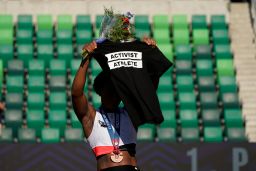US athlete Gwen Berry says she is still thinking about how potentially to mark the moment if she were to reach the podium at the Tokyo OIympics given her history of protesting at major track and field events.
Last month, after qualifying for her second Games, hammer thrower Berry turrned away from the flag whilst “The Star-Spangled Banner” played during the medal ceremony and draped a T-shirt reading the words “activist athlete” over her head.
Berry later said she was “set up” on the podium having been told that the anthem would be played before.
Her actions caught the attention of supporters and critics alike, especially ahead of Tokyo 2020, where the International Olympic Committee (IOC) has upheld the Rule 50 ban preventing athletes from protesting or demonstrating.
Asked if she would observe the Rule 50 ban, Berry told CNN’s Don Lemon: “It depends on how I’m feeling. It depends on what I want to do in that moment, and what I want to do for my people in that moment.”
“And I will do whatever comes upon me and whatever is in my heart,” she added.
The US Olympic and Paralympic Committee permitted athletes to take part in “respectful demonstrations on the topic of racial and social justice” at the trials.
In 2019, Berry lost some of her sponsorships after raising her fist in protest on the podium at the Pan American Games in Peru.
She received a 12-month probation from the US Olympic and Paralympic Committee for the act, which she says was meant to highlight social injustice in America.

READ: Sha’Carri Richardson suspended from US Olympic team after testing positive for marijuana
A complicated history
Berry said she made the decision to protest during last month’s trials because she “will not stand for any type of symbol or song that does not stand for all people in America.”
“It’s the first verse, it’s the third verse, it’s all of these words,” she specified. “Freedom, justice. It mentions slaves. These are things that do not hold true for all Americans.”
Penned by Francis Scott Key in 1814, the “Star Spangled Banner” was inspired by the American victory at the Battle of Fort McHenry. Some interpret the lyrics in the third verse, where Key mentions the word “slave,” as him taking pleasure in the deaths of freed enslaved people, who fought with the British against the United States.
The tradition of playing the anthem at US sporting events dates back to 1918, but other Black athletes have suffered from their decision to use that moment to protest about social justice – notably NFL star Colin Kaepernick.
Berry said her desire to take a stand against social inequality is more important than the impact it might have on her career.
“I’ve already been through all of that […] and yet I am still here, still saying that my Black communities need help.”
‘I’m extremely American’
The 32-year-old Berry has drawn criticism for her actions, but she has also received support.
Whilst White House press secretary Jen Psaki said she hadn’t spoken to US President Joe Biden about the incident, she did say he would admit that “part of that pride in our country means recognizing there are moments where we, as a country, haven’t lived up to our highest ideals,” and therefore defend Berry’s right to “peacefully protest.”
“I think that was spot on. They said it, I respect it,” Berry said in response. “Let’s be clear. I do respect the constitution, because obviously I was exercising my constitutional right.”

She acknowledged the condemnation she had received, saying that while she understood why people took offence, she would continue to stand up for what she believes in.
“They can feel how they feel, but I’m extremely American because I’ll fight for people here, because we’ve endured it here,” she added. “People are still capitalizing off of our unpaid labor force, more than 400 years […] so how can they be mad at me for standing up for my people?”
When asked if she would one day stand up for the flag or the national anthem, she said, “Of course […] until these issues are fixed, until these communities are supported, and until America takes full accountability for the things that Blacks have to face here.
“America is the greatest country in the world. We are capable of fixing these issues. I am tired of talking about them. I won’t do it anymore.”



![Gold medallist Oksana Masters of the US celebrates on the podium after competing in the women's cycling road individual H4-5 time trial during the Tokyo 2020 Paralympic Games at the Fuji International Speedway in Oyama on August 31, 2021. (Photo by CHARLY TRIBALLEAU / AFP) / The erroneous mention[s] appearing in the metadata of this photo by CHARLY TRIBALLEAU has been modified in AFP systems in the following manner: [August 31] instead of [August 30]. Please immediately remove the erroneous mention[s] from all your online services and delete it (them) from your servers. If you have been authorized by AFP to distribute it (them) to third parties, please ensure that the same actions are carried out by them. Failure to promptly comply with these instructions will entail liability on your part for any continued or post notification usage. Therefore we thank you very much for all your attention and prompt action. We are sorry for the inconvenience this notification may cause and remain at your disposal for any further information you may require. (Photo by CHARLY TRIBALLEAU/AFP via Getty Images)](https://media.cnn.com/api/v1/images/stellar/prod/210903163129-oksana-masters-video-tease.jpg?q=x_85,y_8,h_2190,w_3891,c_crop/w_250)
















